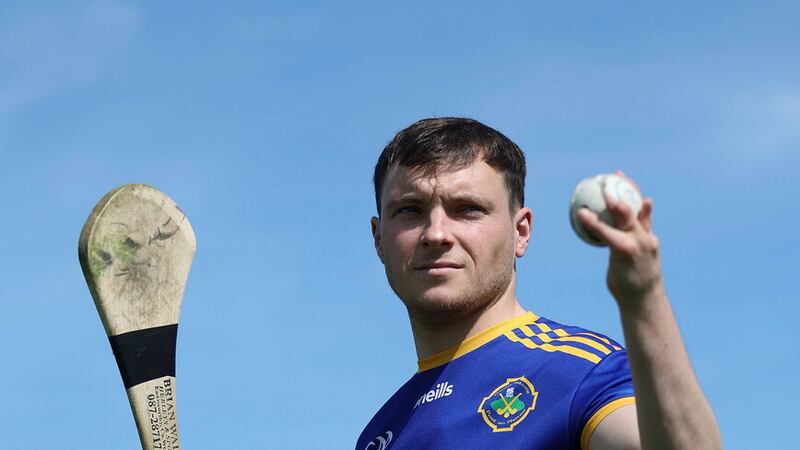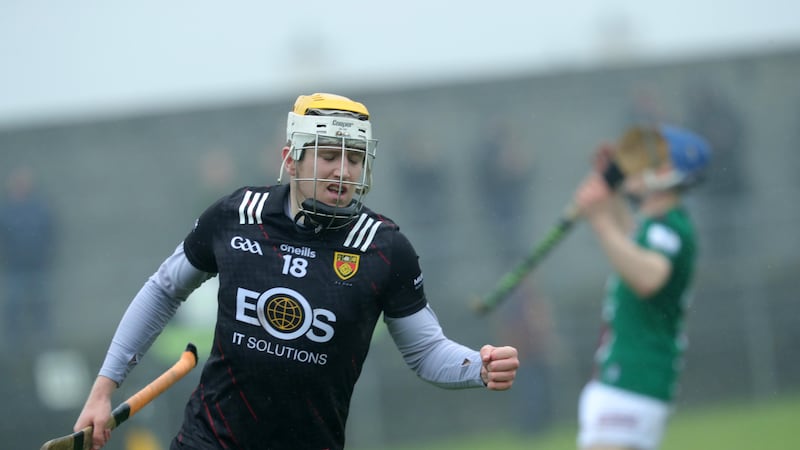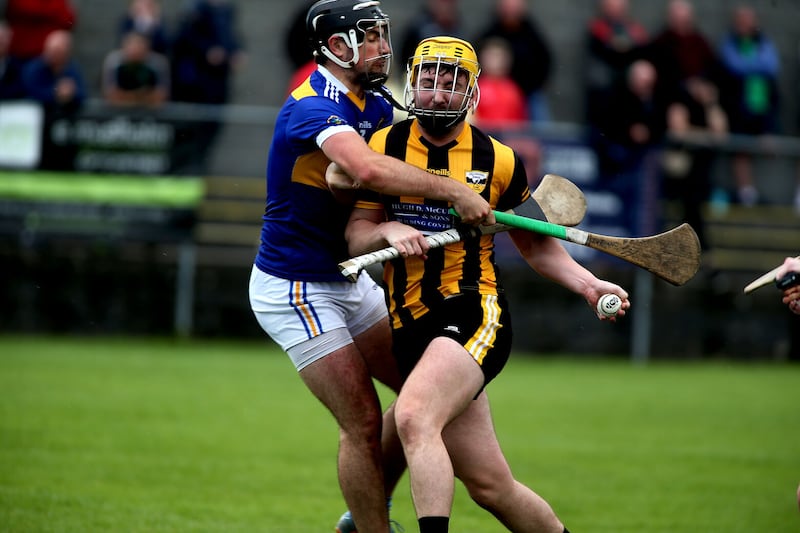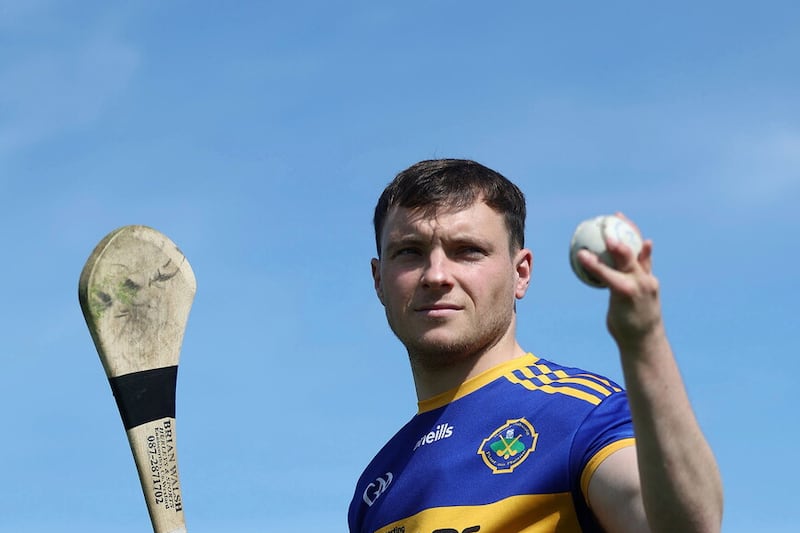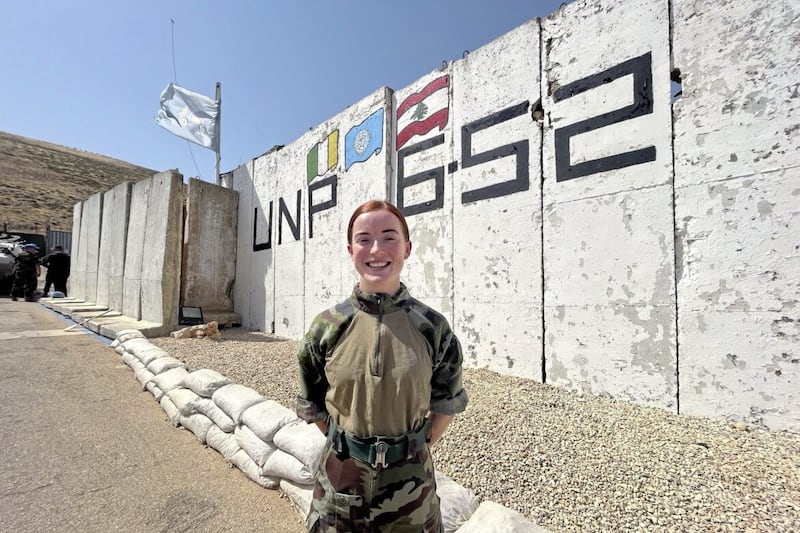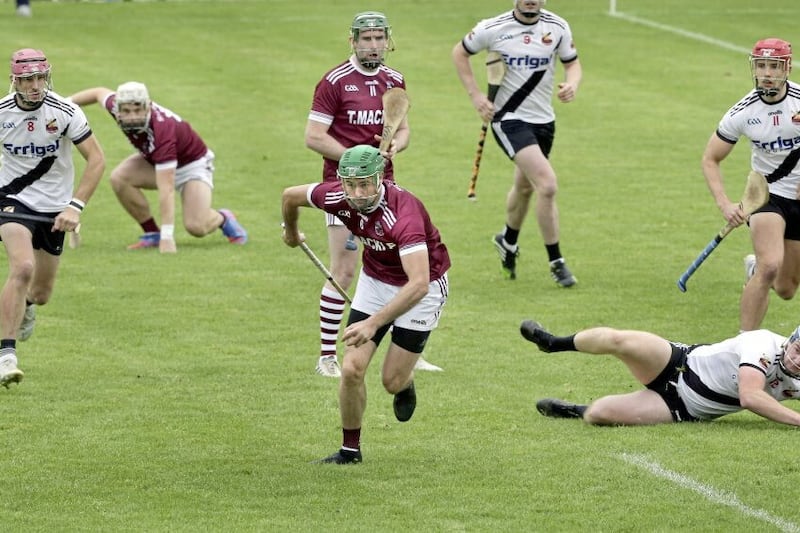SHEETS of rain drive down diagonally as Strangford Lough stirs, a slow trickle of supporters waiting patiently for the ferry as whirring window wipers are granted a moment’s pause, the wisdom of taking the county hurling final out of its Ards heartland questioned from car to car.
Darragh Mallon didn’t mind going to Newry. The last three Down deciders – all between Ballycran and Portaferry – had taken place in Ballygalget. Going to Pairc Esler at least offered something different, even if the weather Gods weren’t smiling on this dank October day.
The game was a bit of a washout too, not that Portaferry cared.
Down to 14 men following the dismissal of captain Conor Mageean, and trailing by two in a game where such awful conditions placed a premium on every point, the Jeremiah McVeagh Cup was being readied for the return trip to McKenna Park.
But, just as a second wind had seen Ballycran across the line 12 months earlier, this time Ronan Blair romped to the rescue for the men in blue and gold, his thunderous late penalty evading Stephen Keith to spark pandemonium among the Portaferry following.
The heavens opened once more for good measure as Mageean lifted the trophy, his cousin Ciara watching from the field with that familiar coat-hanger smile, parish pride something special even in the midst of international high achievers, teeming rain no impediment to a town’s joy.
Oblivious to the water tripping off him, Mallon savoured every second. Just like dad Marty in the decades before, the 26-year-old is a defensive dog of war. This was their bread and butter.
Yet for all the dirty work done as the sliothar slipped from palms and skidded across the sodden surface, it was the stylish manner in which Mallon went about his business that caught the eye – nipping around opponents and playing the game at his pace, a man always with seconds to spare.
But that is not the only thing which marks him out.
Ronan Sheehan was part of the stewarding team in Pairc Esler that day. It came as no surprise to see Mallon excel in trying circumstances.
Although now a staple of Sheehan’s Down senior side, it was over a decade earlier that their paths first crossed - the Newry man cringing slightly at the memory of an U14 development squad session at St Patrick’s College in Downpatrick.
During a drill about hand-passing off the hurl, Mallon was selected for the demonstration. After holding the hurl with his left hand and hand-passing with the right, Sheehan told him to do it again, this time with the other hand.
Mallon held the hurl with the left, hand-passed with the right. Sheehan asked again. Same result. When Sheehan made the request one more time - “no Darragh, with the other hand” – the teenager decided enough was enough, hanging the hurl by his side before holding up his left hand.
"I f**king can’t.”
***************
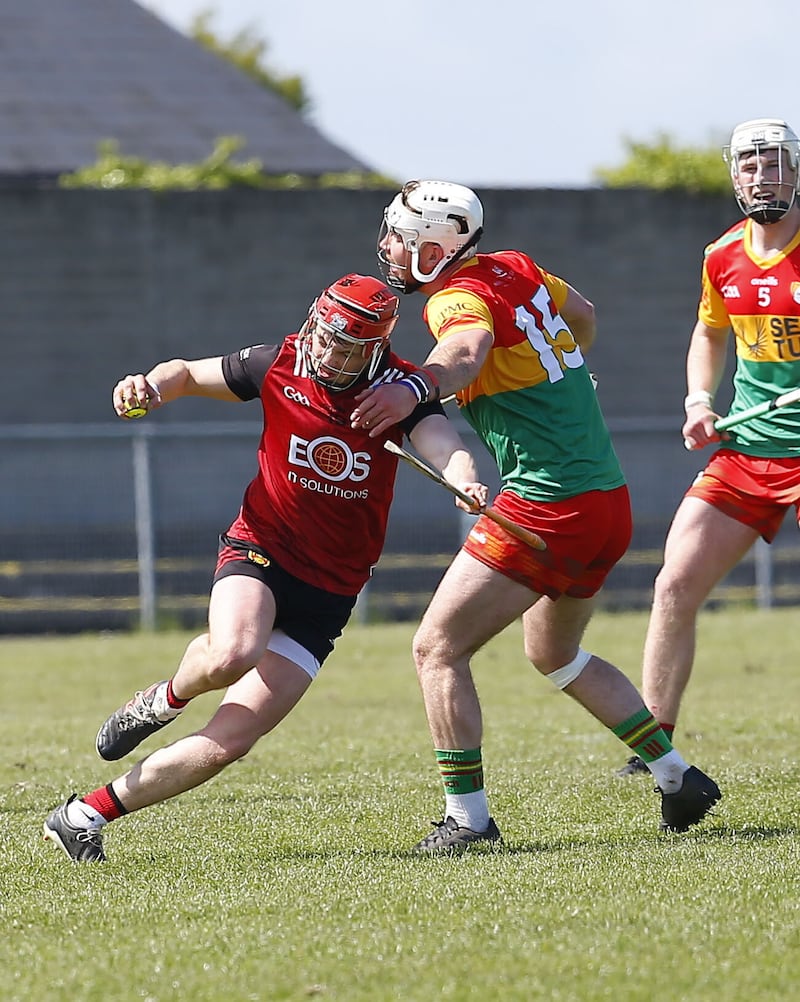
DARRAGH Mallon was born with Poland syndrome, an extremely rare condition which affects one in 20,000 people.
Typically those affected have missing or underdeveloped muscles on one side of the body, resulting in abnormalities that can affect the chest, shoulder, arm and hand. In his case it is the left side – his smaller hand and shorter fingers a red flag in the days after he was welcomed to the world.
In that sense, he counts himself lucky. Plenty don’t find out they have Poland syndrome until teenage years, when the missing pectoral muscle becomes more apparent, while he recently met a man who was 74 when diagnosed.
The CT scans, X-rays, MRIs, skin grafts, the three surgeries before the age of five, Mallon remembers none of it. To him, how he is now is how he has always been.
“I had five fingers, with a wee lump, but my mum made the decision with the surgeons to remove it so there was more room. That there,” he says, pointing to his hand, “is all I’ve ever known.”
And the reason people outside his circle aren’t aware is because he didn’t want them to be. No back slaps, no fair plays, no big deal.
Instead, the sole reason for granting this interview is to raise awareness of the condition, and a charity event he has organised at St Patrick’s Park, Portaferry today.
There will be a raffle - with Scott Brown’s signed Celtic shirt and a Tyrone jersey signed by the 2021 All-Ireland winning Red Hand team among the prizes up for grabs - a barbeque, music and, most importantly, a past v present hurling match, with all proceeds going to Poland syndrome charity PIP UK.
That father could be pitted against son is fitting too, given how family - and hurling - form the central pillars of life in the Mallon household.
Marty was part of a golden generation of Down and Portaferry hurlers and has coached at pretty much every grade. No nonsense on the field, no nonsense off it, his grá for the caman code is a light that will never go out.
Mum Mary Jo is a sister of Anne Sands, wife of Noel, another icon of the Ards, and the siblings are at the heart of all that is good about Portaferry. Darragh and sister Niamh - a free-scoring forward for club and county - grew up pucking about with cousins Eoghan, Daithi and Saoirse Sands, family ties forged in the place that would become their playground.
Even outside of bloodlines, there are connections. Darragh’s girlfriend of almost five years is Erin McGrattan, daughter of Down’s only hurling Allstar, Gerard, while he spends his nine-to-five in Belfast, working as a plasterer for former Portaferry manager Gary Smyth.
“The family is just steeped in hurling,” he smiles, “the whole place is steeped in it.”
Poland syndrome was never going to prevent him following suit.
“I didn’t know any different, so from I was eight years of age I never knew what it was like to catch with my left hand - I always caught with my right.
“The way it evolved was natural to me. Maybe not to everybody else, but it was to me. It was never an excuse, or a reason. It was never a problem because it wasn’t allowed to be.
“My family played a huge part in me having a care-free attitude – ‘it doesn’t stop you doing anything, it shouldn’t stop you doing anything’.”
And that innate understanding of the game, the ability to read the flow of play better than most, comes from trailing his dad to every training session, every match on the way up.
Mallon would study how the backs positioned themselves, how they used their bodies to edge breaks. He’d watch the clever movements of stylish forward Paul Braniff, and how he would engineer that extra yard of space.
He even noted how Braniff would sometimes leave Mass after Holy Communion, and thought it was the coolest thing ever.
Already in the company of men he looked up to, Mallon was part of the furniture long before it was his jersey hanging on the peg.
“It didn’t matter whether it was down the road or up to north Antrim on Wednesday nights, pissing down, doing sticks, water - whatever I was needed for. At half-time I’d have went and got Karol Keating’s sticks, put them up into the other net.
“I just wanted to be part of it. When I was 15, if they were doing training games and needed an extra body, my da would’ve given me a shout – ‘away you go’.
“When I was playing, nobody knew my hand was small or was thinking about that. It was just… I’m normal. I can play, I’m okay at it.”
It was around the same time, though, that frustrations off the field began bubbling below the surface, physical appearance suddenly mattering more when teenage years arrived.
Mallon became increasingly self-conscious about certain clothes, while small, seemingly insignificant things could send him off the edge.
“I struggled with it mentally at times.
“When you get to around 16, then it does play a part. Even things like wearing t-shirts… I have a missing pec muscle, under-developed ribs, so if you were shopping for t-shirts you didn’t want them to be too tight.
“People might not notice it, but I’m thinking about it. I would have hid my hand a bit too, even talking to strangers there would be a part of you didn’t want them to see it.
“Then wee simple things could trigger you about it. Like, if I was opening a bottle of water, sometimes I might not be able to open it so I’d have to change hand - ‘if only I didn’t have this hand, I wouldn’t have to worry about that’.
“All my wee cousins and family friends notice it around five or six, they start asking questions: ‘why do you have a small hand?’ There’s no harm in kids at all, they’re just curious, but that might have been a trigger. It would leave you thinking people are seeing it, looking at it.
“There have been a lot more good days than those kind of days thankfully. They’re just things you have to deal with.”
And he did, he has, with help from those closest.
Erin has an uncanny ability to drag feelings to the fore, even if that is far from his natural domain. Speaking to a psychologist helped too because, for all the good that the ‘nothing to see here’ approach brought once the white line was crossed, it didn’t quell the anger or stop the questions.
“Erin has played a big part in all of this, and in me wanting to do the charity day because there was a time I’d have never done that, wouldn’t have entertained it.
“Even speaking about it now… I would be of the belief that you put it to the back of your mind, don’t think about it, forget about it. But it just kept exploding then - it wasn’t working.
“Erin has helped me accept it, and the psychologist was of real benefit, for me to understand why I feel the way I do sometimes, why I feel like ‘why me? Why do I have to have this?’
“That’s the thing I couldn’t let go, because there’s no biological reason to explain why I have it. There’s so little known about the condition, Poland syndrome isn’t even registered with the NHS - like, I’ve gone to the hospital I don’t know how many times because of injuries through hurling, a few years ago I got shouldered in the ribs so had to go for an X-ray.
“When I took my top off, the doctor was like ‘oh my God, you need to get this seen to right now’, because of the shape of my chest. So I had to explain the condition to three nurses and two doctors. That’s not really good enough.
“If they don’t know the answers, what’s the chances of me knowing the answers? That’s why you just have to find a way to deal with it.”
Occasionally, a bit of innovation is required. In the gym, he wears a wrap around his left wrist to allow full use of all the same apparatus as his team-mates.
And, even though Poland syndrome can impact aerobic ability, Mallon has never used his condition to try and lighten the load when it comes to hurling.
“I’d just say I’m unfit,” he laughs, “if I’m bollocksed it’s not because of my chest. I just didn’t do enough running in training.”
The one concession he has to make, though, is the cold.
Mallon saw only one half of action during Down’s National League campaign as the winter chill lingered on into spring, the balance between a braveheart approach and what is wise not always easily struck.
“One of my biggest regrets was when we played Kildare back in my first year [2019],” says Ronan Sheehan.
“It started to snow, myself and David Herity talked about it afterwards, that we probably should have had the bravery to say these players need to come off the pitch. Boys were getting wrapped up in tinfoil coming off.
“Darragh played that day, and I wasn’t aware to the same extent of how it was impacting on his hand. It took almost two weeks for the hand to come around.”
“In the cold, it just goes mad – pure aching pain, throbbing,” says Mallon.
“I’ve sat for an hour after matches with a hot water bottle on my hand, just because it’s so sore. If I’m on the bench, I’ll be sitting on my hand with a hot water bottle underneath.
“I’ve seen myself playing an Ulster minor semi-final with hand warmers in my sock, then if the ball went up the other end you’d take them out and hold them for a few seconds, then stick them back in the sock.
“The physio has tried rubbing Deep Heat all over my hands, I’ve tried everything…”
Adaptation, and understanding, is a must therefore – but it grinds, no doubt.
To the extent that at one point through the League he considered walking away, such was the frustration of watching from the wings.
“Awww, it’s shit, that side of it.
“And then that plays on your mind. I’d be saying to myself ‘if I didn’t have my hand I’d be playing’. You just want to be out there playing, same as everybody else.
“This year is probably the first time I’ve sat out of matches because it’s just been so sore.”
“It was really getting him down,” adds Sheehan.
“Going forward that’s going to be a challenge for us. Does that mean the first couple of rounds of the National League most years won’t be a possibility for Darragh? Maybe it does, but it’s worth taking that precaution to have him.
“If I can only have Darragh Mallon the last few games of the League then the whole of the Joe McDonagh Cup, well that’s just the way it is. When you look at the days when Darragh is available for Down, and the days when he’s not, you compare and contrast the results and see the value he adds to that team.”
***************
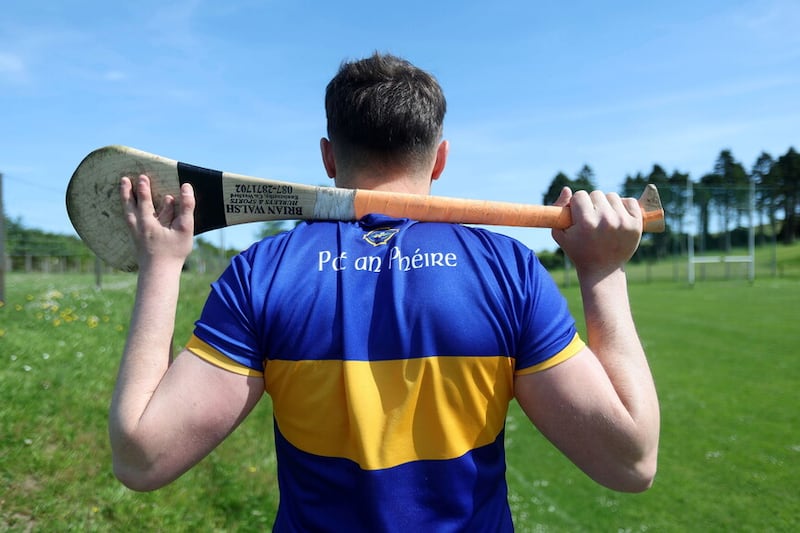
CROKE Park with the Christy Ring Cup at stake, a League decider at Semple Stadium, Joe McDonagh Cup games, Ulster finals, county finals – he has done plenty already, with the hope of much more to come.
But St Patrick’s Park means that bit more than anywhere else. It is where it all started for him and generations of family members, today writing a chapter far from the cut-throat business of other outings in club colours, but one which feels no less significant.
The goal this time is to raise as much as possible for a charity in need of all the support it can get. And if telling his story can help lighten the load for anybody else out there, then it will have been worth doing.
“There was a time I wouldn’t really have wanted to draw attention to it. Even now, I would hate people to think this is about me… I’m not really somebody to put myself out there.
“But then I’m always conscious of a wee kid somewhere who has Poland syndrome, and is feeling the same way I’ve felt in the past. If anybody wants to reach out to me, or to the charity, they are more than welcome to.
“Maybe if they see that I’m playing hurling, working away on a building site, I have a girlfriend, I drive… that I’m just going about life as normal, then they can too.
“I didn’t need to be held back, and I don’t think anybody else should be either. You don’t need to be treated differently.
“If I play bad, it’s because I played bad. Not because of my hand, my chest or anything else - I’ve just played bad. There might be the odd difficult day, I know I’ve had plenty, but life always goes on.”
* To support Darragh’s charity day, visit https://www.justgiving.com/page/pip-uk-poland-syndrome-charity-darraghanderin
